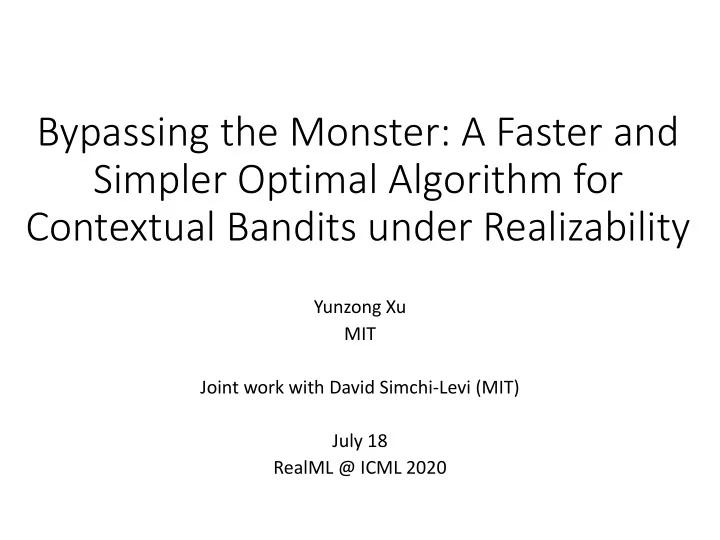

Bypassing the Monster: A Faster and Simpler Optimal Algorithm for Contextual Bandits under Realizability Yunzong Xu MIT Joint work with David Simchi-Levi (MIT) July 18 RealML @ ICML 2020
Stochastic Contextual Bandits • For round 𝑢 = 1, ⋯ , 𝑈 • Nature generates a random context 𝑦 𝑢 according to a fixed unknown distribution 𝐸 𝑑𝑝𝑜𝑢𝑓𝑦𝑢 • Learner observes 𝑦 𝑢 and makes a decision 𝑏 𝑢 ∈ {1, … , 𝐿} • Nature generates a random reward 𝑠 𝑢 𝑦 𝑢 , 𝑏 𝑢 ∈ [0,1] according to an unknown distribution 𝐸 𝑦 𝑢 ,𝑏 𝑢 with (conditional) mean 𝑢 𝑦 𝑢 , 𝑏 𝑢 𝑦 𝑢 = 𝑦, 𝑏 𝑢 = 𝑏 = 𝑔 ∗ (𝑦, 𝑏) 𝔽 𝑠 • We call 𝑔 ∗ the ground-truth reward function • In statistical learning, people use a function class 𝐺 to approximate 𝑔 ∗ . Some examples of 𝐺 : • Linear class / high-dimension linear class / generalized linear models • Reproducing kernel Hilbert spaces • Lipschitz and Hölder spaces • Neural networks
Challenges • We are interested in contextual bandits with a general function class 𝐺 • Realizability assumption: 𝑔 ∗ ∈ 𝐺 • Statistical challenges : how to achieve the minimax optimal regret for a general function class 𝐺 ? • Computational challenges : how to make the algorithm computational efficient? • Existing contextual bandits approaches cannot simultaneously address the above two challenges in practice, as they typically • Rely on strong parametric/structural assumptions on 𝐺 (e.g., UCB variants and Thompson Sampling) • Become computationally intractable for large 𝐺 (e.g., EXP4) • Assume computationally expensive or statistically restrictive oracles that are only implementable for specific F (a series of work on oracle-based contextual bandits)
Research Question • Observation: the statistical and computational aspects of “offline regression with a general 𝐺 ” are very well-studied in ML • Can we reduce general contextual bandits to general offline regression? • Specifically, for any 𝐺 , given an offline regression oracle, i.e., a least- squares regression oracle (ERM with square loss): 𝑡 𝑢 (𝑦 𝑢 , 𝑏 𝑢 ) 2 , min 𝑔∈𝐺 𝑔 𝑦 𝑢 , 𝑏 𝑢 − 𝑠 𝑢=1 can we design an algorithm that achieves the optimal regret via a few calls to this oracle? • An open problem mentioned in Agarwal et al. (2012), Foster et al. (2018), Foster and Rakhlin (2020)
Our Contributions • We provide the first optimal and efficient offline- regression-oracle-based algorithm for general contextual bandits (under realizability) • The algorithm is much simpler and faster than existing approaches to general contextual bandits • We provide the first universal and optimal black- box reduction from contextual bandits to offline regression • Any advances in offline (square loss) regression immediately translate to contextual bandits, statistically and computationally
Recommend
More recommend